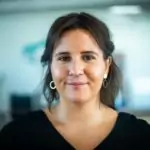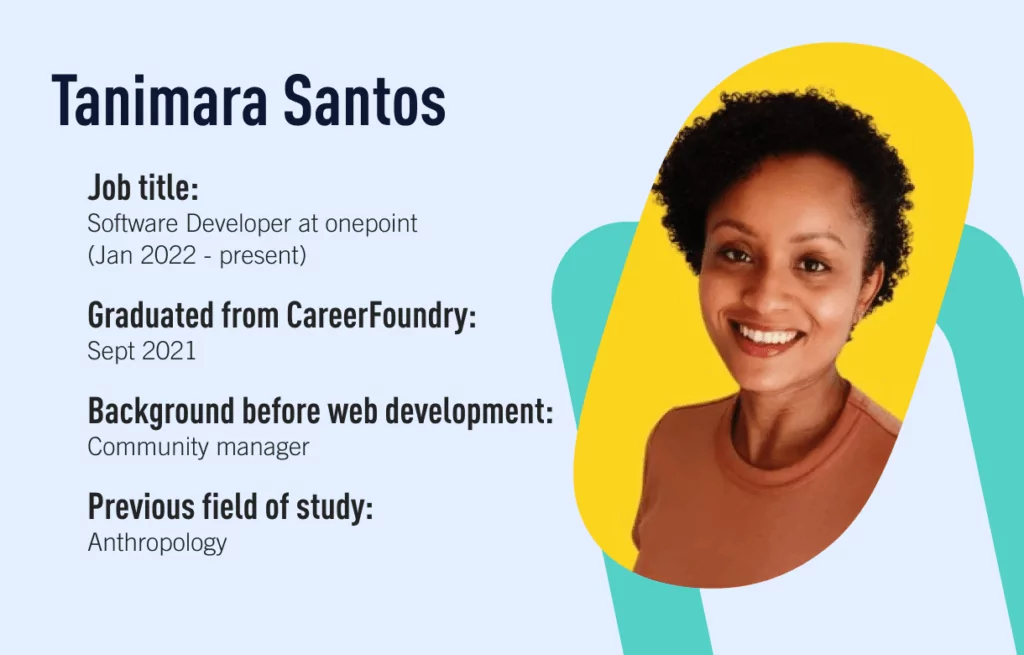
Tanimara’s background sure is fascinating. From studying anthropology in Brazil, to taking on two master’s degrees in Spain, her passion for learning recently led her to the tech industry. She saw a niche for herself in the world of development.
Her curious mind, love of solving problems, and drive to amplify her skillset all came together as she embarked on the Full-Stack Web Development Program at CareerFoundry.
Now working as a software developer for a large consultancy firm in Sydney, I caught up with Tanimara to find out all about her career-change journey.
From discussing the need for more women in tech, to managing lockdown with kids while studying, to sharing her best learning techniques, here’s what she had to say…
Hi Tanimara. Thank you so much for speaking with me today! To begin with, could you tell me a little bit about yourself and your background?
Hi Alison! Sure. I was born in Brazil and I moved to Spain in my 20s. I originally graduated from university in Brasília with a degree in Anthropology and a speciality in social sciences. I started working in Brazil as an anthropologist, and then I worked as a program assistant at the United Nations, working on the Development Fund for Women programs.
That’s when I decided to move to Spain to study for a master’s degree in Gender Studies, because it was related to what I was working on at the time and I found it so interesting. When I finished that, I also decided to take another master’s degree in Spain, this time in research methodology. I’ve always been someone that loves learning; I still always want to learn and try new things.
Wow, what an interesting background! What were you doing just before you decided to take the CareerFoundry program?
While studying for my most recent master’s, I was working for a video game company in Spain as a community manager for the Portuguese-speaking community. I moved around a little more, until my husband’s company relocated us to Australia. So I left my job in Spain, ready to start a new chapter with my family in Sydney.
What made you decide to study web development?
My last master’s was focused on innovative technologies and applications; that’s when I started to get the spark for web development. Interestingly, I hosted some seminars in the video game industry promoting the participation of women in technology, which were fantastic. That was really the point where I thought I could see myself working elsewhere in the tech industry.
Right after moving to Australia, I decided to study R, the programming language, which was challenging for me because there was a lot of math involved and it scared me at first! But, during that course, I realized that I was able to overcome obstacles that came my way, and with this mindset I felt ready to take on a new challenge in Australia. However, that’s when I got pregnant with my second child, and I focused all my energy into raising my kids.
When my youngest was a year old, we put her in daycare for a few days a week, as I wanted to go back to studying (things like the R course) and I wanted to plan my return to the workforce. I wasn’t quite sure which career path would suit me though.
I decided that I wanted to try web development, even though I initially thought about a career in data. In previous jobs, I had learned how to analyze data, I also had a relevant educational background for a career in data, and the R certification under my belt.
In the end though, I thought that web development would open more doors for me, and that’s how I came to study with CareerFoundry.
That’s really interesting about the women in tech seminars, and how they inspired you to elevate your career in the tech industry.
Yes, through those seminars I saw that there were a lot of women trying to promote the participation of more women in the technology sector. I started to read about it because, as I mentioned, I’m a lifelong learner, so whenever I get interested in a topic I dig deeper into it—Google will forever be my best friend!
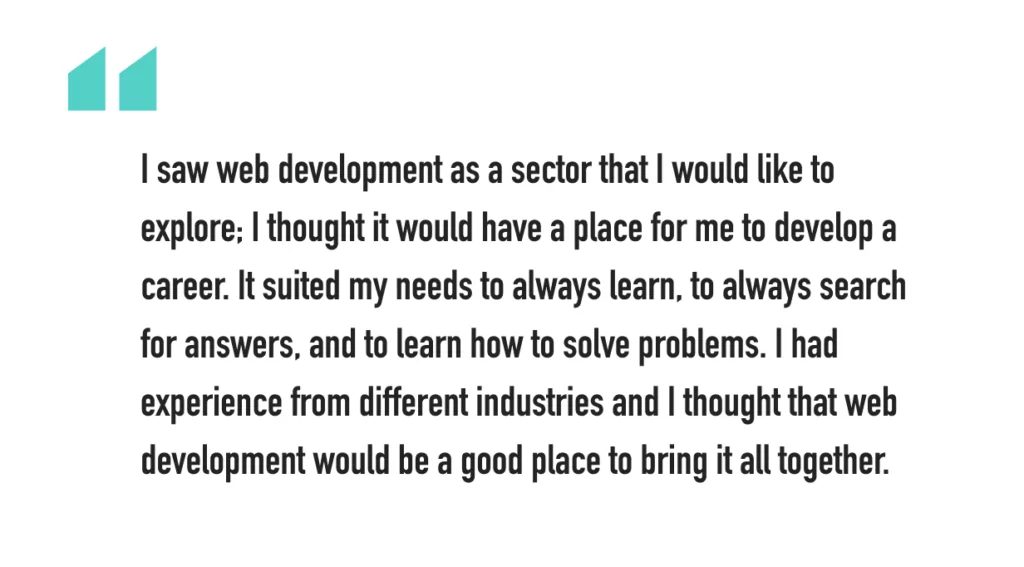
So, you studied the Full-Stack Web Development Program with CareerFoundry. How did you find the program?
I studied during the pandemic, so it was quite challenging because I had two kids to take care of. My eldest was four and the youngest was one at the time. I didn’t have as much time to study as I’d hoped, because the children were home during lockdowns and school closures, but my husband was really supportive and we tried our best at balancing childcare, work, and study schedules.
What did you enjoy about the program?
It was interesting because I hadn’t taken such a long course remotely before, but the calls that I had with my mentor were amazing. I could ask him anything and he would always help me, whether it was updating my resume, learning more about companies in the industry, or helping with any errors that would arise in my code.
My tutor was also really helpful as every time I made mistakes, or every time it took me longer than he thought it should have to finish a task, he would get in touch with me and try to explain concepts further.
Even when I had technically succeeded, if he could see that I hadn’t fully understood something, he would try to explain it to me in a different way, just to help me understand it a bit better. It was a really nice learning experience because of both of them.
That’s so nice to hear. What about any challenges you faced?
The materials were all clear and I could understand it all when reading through everything, but putting it into practice was a bit different. It was all new for me. Not just the technical side of things, like learning new coding languages, but also the learning experience in general.
It took me a while to adapt, especially when I started to learn about backend development. But it was really rewarding at the same time—after, you know, crying a bit, and sweating a bit, I actually got things to work. And when things worked and all my tasks were approved, it was the best feeling!
I can imagine! It sounds like you really persevered. Were there any study techniques that helped you during the program?
The Pomodoro technique was really helpful and I still use it today at work. It helps me to maintain focus and flow. I think that when you get into a rhythm, then the code flows easier, and Pomodoro helps with that.
I also use Trello all the time. I set goals for the week, and I like having set hours to study certain subjects. The Focus Mode in the CareerFoundry platform was amazing too. It made sure I wouldn’t get lost in all the tabs that I had open with Google and YouTube tutorials!
Speaking of which, I was always researching on Google and YouTube how to better prepare myself for what was to come in the future weeks by looking ahead at the curriculum. I would study during the day and once the kids were asleep, I would do further reading on anything that would help me get through the following day or week.
I was also part of a WhatsApp group with fellow students at CareerFoundry. We were not all at the same pace, but they were really helpful as I could see from the chat which parts of the program were the hardest, so I would know when I would have to put in some more effort. People in the chat would reassure us when more complicated exercises came up, and share valuable advice for detailed parts of the tasks—like variable naming conventions, for example.
Some great tips there, thank you for sharing! What happened when you finished the program? Did you start looking for a job while still studying, or did you do the Job Preparation Course before applying?
I wanted to finish the immersion course on time, and when I spoke with my career specialist the first time I told her that I couldn’t start my job search while still studying because I had a limited schedule to finish the main course. She sent me some information about the Job Preparation Course in advance, which really helped. I familiarized myself with that material in the evenings, after working on the immersion course during the day.
I finished the main program on time—it was a huge victory for me! Then I was able to start the job prep course properly. It was really, really helpful. Without the career specialist, I don’t think I would have had the courage to go to an interview as I did, because it had been seven years since I had last interviewed for a job and I was completely out of practice. I didn’t know that people could create networks through LinkedIn, for example, and my profile there was not up to date at all.
My career specialist helped me with finding the best way to explain the gaps in my resume, as during the last five years I had been studying and taking care of my children. I was concerned about how to present this to a prospective employer. She told me to just be honest from the beginning, which seems logical now, but I found conflicting advice on the internet for people trying to rejoin the workforce.
The methods she utilized to help me organize my previous experiences were also really useful. She helped me to update my LinkedIn, my resume, and showed me a model to prepare cover letters that was mind-blowing! She sent me a lot of details on web development networks with a focus in Australia. She helped me analyze some of the companies that were hiring, told me a bit about their culture, and what I should expect after the first interview.
I wasn’t expecting the job prep course to be so helpful, to be honest. I thought it would cover some extra information that I probably could just find online, but it was not like that at all. It was really worth the time investment.
Good to hear! What was the job-searching phase like?
I started looking for jobs as soon as I finished the job prep course. I used the recommended job search tracking sheet, which was fantastic because I would apply to so many positions and the sheet was the only way for me to control my progress and keep track of which ones I had already applied to.
I was applying to a number of positions each week, and, unfortunately, I wasn’t getting any answers. I wasn’t too discouraged because I was completely aware that it would take me a while, and at the same time I was working on growing my network through LinkedIn and online events.
There were a lot of recruiters getting in touch with me through LinkedIn, but they all wanted someone with development experience and I didn’t have any. They could see previous work experience on my resume, and I think that’s why they got in touch. But as soon as we started to talk and I would tell them that I didn’t have any experience in web development, things would fall through.
I really was out there trying my best, with all my heart, excited about starting to work as a developer. I think that energy helped and I was also quite lucky because the first company that decided to seriously interview me was the one that sent me the job offer for the position I have today.
What was the hiring process like?
With onepoint—the company I am now working for, someone got in touch with me via LinkedIn. It looked like the same kind of conversation I mentioned before, however the person was not a recruiter. She’s a senior software developer. She wanted to have a quick chat to see if I would be a good fit for their open role as a junior software developer.
I prepared myself so much! I read everything about the company, I connected with them through LinkedIn, I read all their content. They have a lot of content in French, so I refreshed my French skills in order to read that too!
In that first interview, she told me about the project that I would be working on, which kind of technologies I’d be using, and what they were expecting from a junior developer. I asked a lot of questions. As a result of that conversation, she decided to take me to the next stage which was a general interview with her to talk about myself, my studies, and my previous experience.
I was really nervous about all the stages of the process, even though I had prepared all the standard interview answers with my career specialist. I practiced my answers and recorded them, I did mock interviews with my husband, and even with my mom. During the actual interview, there were some answers that didn’t come out the way I had planned because, well, that’s life—but all the preparation I had done helped me feel at ease.
I knew how to talk about myself as a professional in different situations, and my career specialist helped me a lot with that. For example, I knew how to talk about a bad experience with a colleague, but transform it into a learning situation, or how to talk about a challenging trait that I have improved upon, instead of going down the route of saying I was a perfectionist. I could always find a way to answer things about my professional history because I had taken a focused look at it, and I felt really comfortable doing the interview because I felt well prepared.
After that interview, I was invited to the next stage which was a technical interview. I was a bit scared of that because, for me, that was the hardest part of getting into the industry. I had learned things from scratch and even though the CareerFoundry learning was amazingly thorough, and focused on full projects, I knew there would be some areas where I would be lacking from a theoretical point of view, or questions that I wouldn’t know how to answer.
Awareness is a blessing because it made me look for ways to strengthen the gaps I had in my skillset before the interviews began. I signed up to a course on algorithms and data structure which was recommended to me, which helped me to understand the basics.
From the first interview, I started to practice coding with React, which I knew was a technology that the company was looking for someone in this role to use. I studied the section of React on freeCodeCamp, and I also re-did my tasks with CareerFoundry on React! All before the technical interview.
You certainly prepared a lot! How was the technical interview?
The technical interview itself was like a game. They had 14 questions which mostly required just choosing the right answer, but at the end there were a couple where I had to write code.
Unfortunately, I didn’t manage to complete the test on time as I got stuck on a few questions. I was a bit annoyed that I ran out of time, but luckily, I managed to remember one of the last two questions afterwards, which involved building a small counter in React. I wanted to make sure that I could actually do it for myself and so straight out of the interview, I started to build the counter.
I did it, and when I finished, I thought, I’m going to send it to them, just in case. They could consider it as me being proactive. And I don’t know if it was that or something else, but it actually worked! The next email I got from the interviewer 12 days later was the job offer. It was the best feeling ever!
I was still applying for other positions in the meantime but I tried my best to keep my hopes up while I waited, especially since I felt I did a great job with the technical task. My husband kept reassuring me that I was still being considered for the role, and my mom was positively sure that I would get the job!
After three months of job searching and eight months of studying, I cannot describe the way I felt when I received the offer—it felt like I had really accomplished something big! For all the years that I’ve been in and out of different master’s degrees, trying to make my way defining a career path that would suit me, it felt like I was closing this chapter and about to begin a new one as a software developer.
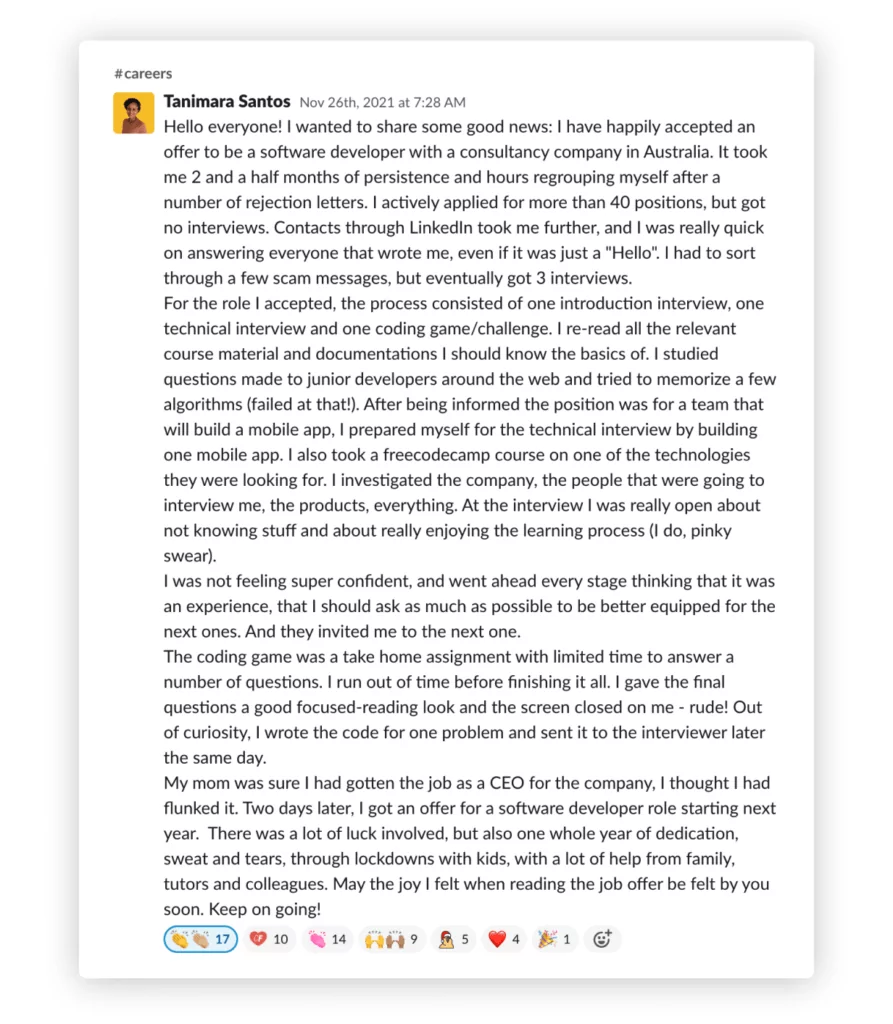
Congratulations! Could you tell us a bit more about onepoint and what it’s like working there as a junior software developer?
Of course. onepoint is a large consultancy firm based in France, with offices all around the world. I actually start the day just going through emails. I go through everything to stay informed, because it’s such a large company with a lot of social networks and internal hubs.
Then I start working on my projects. I have been working on three different projects so far and the company has allowed me a lot of space to study, which is really amazing, because there’s a lot of new information to take in! For example, I recently did a certification on scrum—an agile software development framework.
We also have access to a learning platform called O’Reilly, so whenever I start working on a new project, I’m encouraged to use that to learn and develop my technical skills. There’s access to so much material there as well as interactive courses, so whenever I’m having my five minute break from Pomodoro I’ll switch to that and refresh myself a bit. They have also granted me access to Udemy courses, and since I joined I’ve already managed to get two certifications!
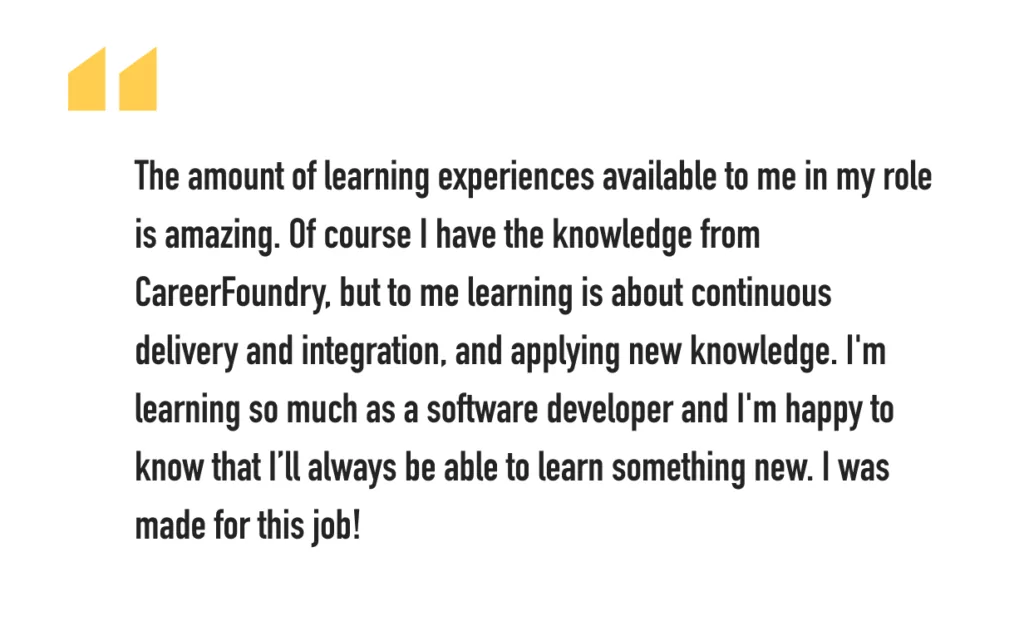
It has also been really challenging, because with CareerFoundry, it was all autonomous and I could manage my own learning, my own repositories, my own pull requests and merges. I didn’t have to share code with anyone, and I didn’t have to collaborate with anyone. Being a part of a team is different, and there is a learning curve to that. But it’s totally worth it.
What would you say is the most rewarding thing about working in development? Maybe for you it is the learning opportunities?
Constant learning is a big part of what attracted me to this industry. You will always have stuff to learn, you have to discover how things work for yourself, and you will always have to use new technologies to develop applications.
But I think that another rewarding part is making digital things that work—when you can see the webpages moving, when you enter information in one place and it comes out on the other side, when you can analyze that information and make a product out of it. To me, that is amazing.
I tell my kids that “I do the internet.” My 5 year old is like, “What is it?” and I’ll say “Whatever you click or pinch on the screen here, I can make it work!” That’s a great feeling. Knowing that my work is of value to others and that I’m making something people can actually use makes me really happy.
Do you feel like the skills and knowledge you learned from CareerFoundry are helping you in your job now?
Yes, I still use the materials from CareerFoundry now. I’m re-reading the curriculum content on AWS Lambda now because I need it for work. It’s really, really helpful for me because the language in which the CareerFoundry curriculum is written is so accessible compared to other resources I’ve found online. And of course, I’ve already gone through it once before, so for me, it’s a whole lot easier than trying to understand the vocabulary, or another teacher, elsewhere.
How do you feel like your life has changed since you studied with CareerFoundry?
I was a stay-at-home mum when I started the program, so it’s a 180 degree change! It was really important for me to find a career path where I could work remotely, so that I could still have time to be with my kids at home, but also do something that was rewarding, and that would suit my need to always learn.
There are a lot of remote jobs in web development, and it’s also a job that promotes and encourages people to always keep on learning, so I feel like my aspirations are now fulfilled.
It sounds like you’ve got a good balance—with family, work, and with your remote set up. Do you have any hopes for the future—a career goal or any other industries you’d like to work in?
I would like to stay in consultancy because I like the rhythm; going through different projects and always learning different things. I think that it is important for me to keep on with a fast pace and not have the time to get bored. I think that’s what motivated me to study so much during the last few years—I like to challenge myself to learn new skills.
I also think that finding a place with a diverse culture is important wherever I go. In the company I am in now, there are people from all cultural backgrounds and that makes the place welcoming and fun for me.
Do you have any advice for somebody reading this who’s just getting started with their career change into the world of web development?
A lot of people contact me on LinkedIn asking me how I became an employed software developer. I’ve talked to a few people asking about projects, who want to know how I started to build them. They always tell me that they want to study React or Angular first, and then start working on their portfolios.
What I have been telling them, however, is to start with the basics. Start with JavaScript or vanilla JavaScript, HTML, and CSS. Build your portfolio with the basics first, and then elevate your skills with learning. That’s more or less the structure of how it works with CareerFoundry and the Full-Stack Web Development Program.
Once you have the basics, you can then start working on the skills that you want to present to the job market. But it’s important to lay the foundation in the beginning. Your portfolio needs to be presentable early on, and people will not mind if it’s not built with React or Angular when you are a junior developer—or at least they didn’t in my case.
If you can handle the basics and if you understand a bit about data structure and algorithms, I think that will be enough to prove to companies your will to learn. I’d like to emphasize that you have to have the will to learn. I think that’s what matters the most for hiring managers when they are looking for people to fill junior developer positions.
Although, don’t be paralysed by the fear of not knowing things when starting projects. This is a very common feeling—it’s called impostor syndrome. I feel it too, but I don’t let it stop me from engaging and asking questions and looking like a junior, because, well, I am a junior.
Show your employers that you have the will to learn and that you’re doing everything you can to learn how to do the job that they need you to do. As a career changer, you’re not going to be hired as an experienced professional in your first year out of a bootcamp, but they could hire you as a person that can grow—as someone that has the will to learn and the ability to turn into a good professional. So learn the basics first. An online course is an amazing way to get there.
Recommended reading: Career Change Stories: Advice From Women in Tech
Great advice to end on! Thank you so much for sharing your story with me, Tanimara. It’s great to hear you speak so passionately about your new career, and I wish you all the best for your future.
Has Tanimara’s story piqued your interest for a career as a developer? Find out if web development is a good fit for you with this free, introductory, short course. If you’d like to learn more about how to retrain for a career in tech, we recommend speaking with one of our program advisors.
